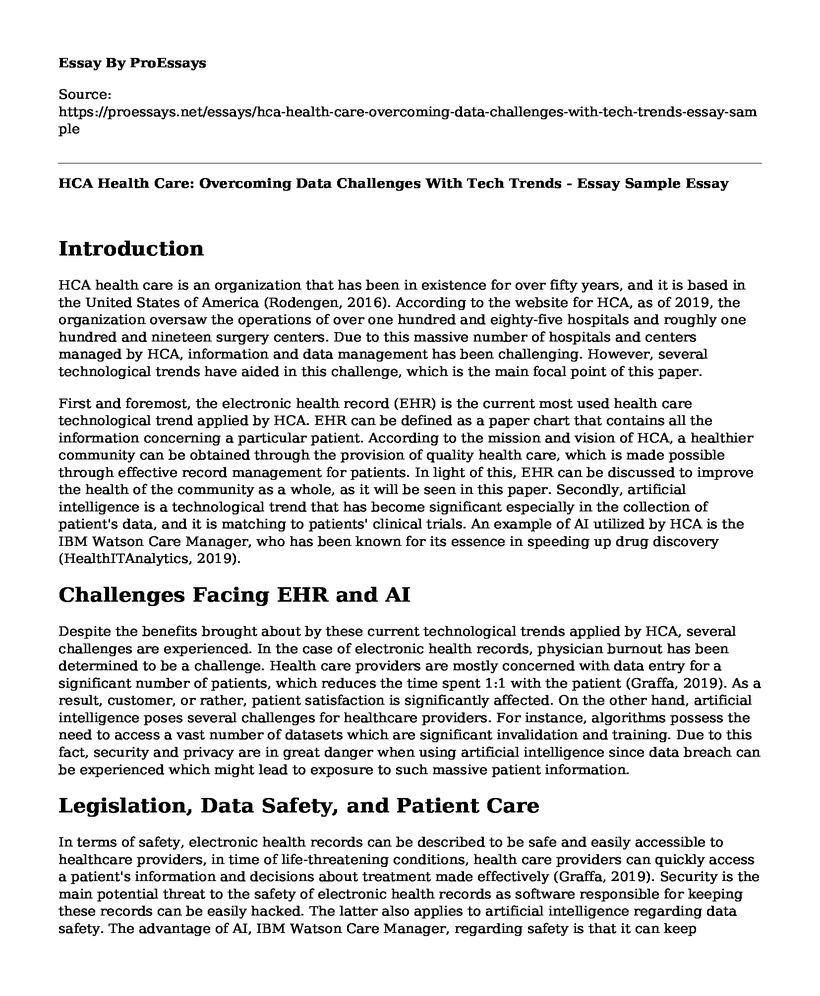Introduction
HCA health care is an organization that has been in existence for over fifty years, and it is based in the United States of America (Rodengen, 2016). According to the website for HCA, as of 2019, the organization oversaw the operations of over one hundred and eighty-five hospitals and roughly one hundred and nineteen surgery centers. Due to this massive number of hospitals and centers managed by HCA, information and data management has been challenging. However, several technological trends have aided in this challenge, which is the main focal point of this paper.
First and foremost, the electronic health record (EHR) is the current most used health care technological trend applied by HCA. EHR can be defined as a paper chart that contains all the information concerning a particular patient. According to the mission and vision of HCA, a healthier community can be obtained through the provision of quality health care, which is made possible through effective record management for patients. In light of this, EHR can be discussed to improve the health of the community as a whole, as it will be seen in this paper. Secondly, artificial intelligence is a technological trend that has become significant especially in the collection of patient's data, and it is matching to patients' clinical trials. An example of AI utilized by HCA is the IBM Watson Care Manager, who has been known for its essence in speeding up drug discovery (HealthITAnalytics, 2019).
Challenges Facing EHR and AI
Despite the benefits brought about by these current technological trends applied by HCA, several challenges are experienced. In the case of electronic health records, physician burnout has been determined to be a challenge. Health care providers are mostly concerned with data entry for a significant number of patients, which reduces the time spent 1:1 with the patient (Graffa, 2019). As a result, customer, or rather, patient satisfaction is significantly affected. On the other hand, artificial intelligence poses several challenges for healthcare providers. For instance, algorithms possess the need to access a vast number of datasets which are significant invalidation and training. Due to this fact, security and privacy are in great danger when using artificial intelligence since data breach can be experienced which might lead to exposure to such massive patient information.
Legislation, Data Safety, and Patient Care
In terms of safety, electronic health records can be described to be safe and easily accessible to healthcare providers, in time of life-threatening conditions, health care providers can quickly access a patient's information and decisions about treatment made effectively (Graffa, 2019). Security is the main potential threat to the safety of electronic health records as software responsible for keeping these records can be easily hacked. The latter also applies to artificial intelligence regarding data safety. The advantage of AI, IBM Watson Care Manager, regarding safety is that it can keep identifiable information that is personal out of data pools, which have become very promising (HealthITAnalytics, 2019).
Regarding patient care, electronic health records are crucial as they offer easy accessibility to patients' files, which is also experienced in artificial intelligence. The latter also is time-saving as it can link a patient clinical trial with a patient (Graffa, 2019). However, lack of patient satisfaction is established when dealing with these technological trends as there is a lack of interpersonal interactions between health care providers and patients. Lastly, legislation is also a crucial factor when considering these two technological advancements. Data security is made possible when using AI and EHR which is a requirement by law. However, most people are illiterate towards technology nowadays and understanding the laws governing these data systems might be hard, which usually leads to data breach hence affecting the safety of the information provided by a majority of patients (HealthITAnalytics, 2019).
Future of Health Care in HCA
The healthcare technology trend that will impact nursing practice in the future is interoperability. The latter will provide linkage between different disparate systems with patient's information, which will enable communication of patient's data smooth and efficient. Lack of interoperability has been mentioned to be one of the demerits of patient record-keeping, as disparate systems are unable to communicate with each other effectively. Interoperability will lead to an improvement in patient care outcomes and data management. Nowadays, consumer needs to rise and expand beyond the health care industry (Johnson, 2017). Consumers, especially the young generation, are hungry for information that must be provided by the health care system to ensure that they are fully satisfied. In doing this, systems, inclusive of uber, Amazon, among others, need to be linked to ensure that all services are made available for a patient, which will, in turn, improve consumer satisfaction, data management, and patient care.
References
Graffa, R. (2019, April 29). The Benefits and Challenges of Electronic Health Records. Retrieved from https://www.sehealthcarequalityconsulting.com/2018/09/18/the-benefits-and-challenges-of-electronic-health-records/.
HealthITAnalytics. (2019, September 29). Arguing the Pros and Cons of Artificial Intelligence in Healthcare. Retrieved from https://healthitanalytics.com/news/arguing-the-pros-and-cons-of-artificial-intelligence-in-healthcare.
Johnson, M. (2017, May 22). Health Care of the Future: Interoperability. Retrieved from https://hcatodayblog.com/2017/04/11/health-care-of-the-future-interoperability/.
Our mission, vision, and values. (n.d.). Retrieved from https://www.hca.wa.gov/about- hca/our-mission-vision-and-values.
Rodengen, J. (2016). The Legend of HCA: Hospital Corporation of America. Florida: Write Stuff Enterprises Inc.
Cite this page
HCA Health Care: Overcoming Data Challenges With Tech Trends - Essay Sample. (2023, Mar 23). Retrieved from https://proessays.net/essays/hca-health-care-overcoming-data-challenges-with-tech-trends-essay-sample
If you are the original author of this essay and no longer wish to have it published on the ProEssays website, please click below to request its removal:
- The Worst Fat in the Food Supply - Public Health Essay Sample
- Essay Sample on King's College Hospital
- Healthcare Operation Management: Essay Sample
- Nutritional Requirements During Pregnancy: Understanding Health Risks - Essay Sample
- Essay Example on Energy Consumption and Its Impact on Economic Growth
- Griffin Home: Creating a Difference for Elderly Care & Security - Essay Sample
- Maximizing Solar Resource Availability for Sustainable Energy Generation - Essay Sample







